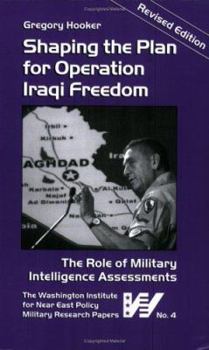Shaping the Plan for Operation Iraqi Freedom: The Role of Military Intelligence Assessments
The aftermath of the war in Iraq has generated a great deal of second-guessing about Washington’s prewar planning and intelligence efforts. Largely missing from this debate has been a thorough... This description may be from another edition of this product.
Format:Paperback
Language:English
ISBN:0944029981
ISBN13:9780944029985
Release Date:July 2005
Publisher:Washington Institute for Near East Policy
Length:114 Pages
Weight:0.40 lbs.
Dimensions:0.4" x 5.5" x 8.6"
Customer Reviews
2 ratings
A Worthy First Shot
Published by Thriftbooks.com User , 18 years ago
Tom Donnelly said well, what was the biggest intelligence failure on Iraq? Most would answer, "Failure to find weapons of mass destruction." But far more important, given the long-running counterinsurgency campaign, was the failure to comprehend the nature of Iraqi society and politics. Many of the problems U.S. troops face today stem from the faulty understanding that shaped the original invasion plan. The enormity of the failure merits scrutiny. Suffice it to say that the fault was general across all agencies of government and almost no one correctly foresaw the shape of post-Saddam Iraq. It will take some time to catalog the full scope of intelligence and policy follies, but Hooker's monograph is a worthy entry. Hooker had a ringside seat for Operation Iraqi Freedom planning as senior intelligence analyst at U.S. Central Command (CENTCOM) where he has worked since 1996. This job made him aware that military policy, particularly the Pentagon's desire to fight a fast war in keeping with the theories of military transformation, militated against a deeper understanding of the potential for an Iraqi insurgency. Moreover, the inability to settle on a single war plan--in the two years prior to the invasion, CENTCOM was directed to prepare three separate plans--made for shallow analysis. Finally, the indecisive direction provided by Defense Secretary Donald Rumsfeld, euphemistically described as an "iterative" approach, "injected numerous ideas into the [planning] dialogue, many of which were amateurish and unrealistic." As Hooker observes, "Rather than refining the plan in successive operational variants, this process ultimately drove the planners toward increasingly unrealistic assumptions" until they finally paid no attention to Pentagon directives. Hooker suggests that disconnects between the Pentagon and CENTCOM had an even unhappier result. The squabbles over the invasion plan diverted attention from discussions about the post-invasion plan, the infamous "Phase IV" plan. "Although planners expected violence and civil disorder in Phase IV," writes Hooker, "they generally thought it would be sectarian violence among Iraqis rather than predominantly insurgent violence against coalition forces." But if Hooker understands the effects of Pentagon shenanigans on military planning, he is on shakier ground when it comes to their causes. He repeats too freely the politically motivated complaints of former intelligence officials whose knowledge of Pentagon planning efforts was indirect and often inaccurate. But this is a small quibble. Hooker has provided us with important insights into the shambles that was pre-Iraq planning. More needs to be done to tell the full story, but Hooker has limned the most important themes.
An Insiders View of the Planning for Operation Iraqi Freedom
Published by Thriftbooks.com User , 19 years ago
On the first table you see as you walk into book stores these days you will find books on how we are losing the war in Iraq and right next to them are the books talking about how great we are doing in Iraq. It reminds me of the pro-Bush, anti-Bush books from just before the election. I wonder if they are by the same authors. Only now, here and there are books coming out that are written by the people actually involved in the operation. In the case of planning for Operation Iraqi Freedom, that responsibility was assigned to CENTCOM (Central Command) headquarters in Tampa, Florida. This book, written by the senior intelligence analyst for Iraq at CENTCOM describes the planning process, the questions being asked, the intelligence being gathered and the final plan developed for the invasion of Iraq. Obviously he has the advantage of hindsight, but also obviously, the plan worked when it was put into practice by the American and allied forces. This book provides a fascinating insight into how the planning process actually works within the military.






